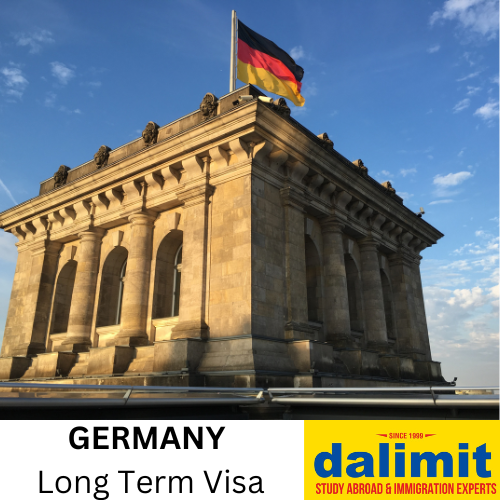
A Germany long-term visa, also known as a Type D visa, is essential for stays exceeding 90 days for purposes such as employment, education, family reunion, or other extended visits. Applicants must submit a completed visa application form, a valid passport with at least three months validity beyond the intended stay, and recent biometric photos. Additionally, proof of purpose is crucial: this could be a job contract, university admission letter, or documentation of family ties in Germany. Financial stability proof, showing the means to support oneself throughout the stay, and valid health insurance are also mandatory. Accommodation details and, for some visa types, language proficiency may be required.
Applications are processed at the German embassy or consulate in the applicant’s home country. Typically involving an interview and a non-refundable processing fee. Processing times vary, so applicants are advised to apply well in advance of their intended travel dates. Upon approval and arrival in Germany, registering the residential address is mandatory, and further residence permits may be necessary for extended stays. Specific requirements can differ based on the purpose of the stay. The applicant’s nationality, so consulting the official embassy or consulate website is advisable before applying
PURPOSE OF STAY
The purpose of stay refers to the reason an individual intends to be in Germany for an extended period, typically exceeding 90 days. Common purposes include:
- Work: Employment with a German company or as a freelancer, often requiring a job offer and sometimes approval from the Federal Employment Agency.
- Study: Enrollment in a German educational institution for academic purposes, such as university studies or research programs.
- Family Reunification: Joining family members who are already legally residing in Germany, such as spouses, children, or parents.
- Internship: Participation in a specific internship program that provides practical experience in a German company or organization.
- Language Course: Enrollment in an intensive language course as a primary activity during the stay in Germany.
- Research: Conducting research at a German institution or university, often requiring collaboration or sponsorship.
- Other Purposes: Participation in voluntary service, medical treatment, or any other approved activities that require an extended stay in Germany.
GERNRAL REQUIREMENT
The general requirements for obtaining a long-term visa (Type D visa) for Germany include:
- Application Form: A completed and signed national visa application form.
- Passport: A valid passport that remains valid for at least three months beyond the intended stay in Germany, with at least two blank pages.
- Biometric Photos: Recent passport-sized photos meeting German biometric specifications.
- Purpose of Stay Documentation: Depending on the purpose (e.g., work contract, university admission letter, family ties), relevant documents must be provided.
- Financial Means: Evidence of sufficient financial means to cover expenses during the stay, typically through bank statements, sponsorship letters, or similar.
- Health Insurance: Proof of valid health insurance coverage for Germany that meets the requirements set by German authorities.
- Accommodation: Documentation showing where the applicant will reside during their stay in Germany, such as a rental agreement or confirmation of accommodation.
- Language Skills: Depending on the purpose of the visa (especially for work or study visas), proficiency in German or English may be required.
- Visa Fee: Payment of a non-refundable visa application fee, which varies depending on the type and duration of the visa.
- Additional Requirements: Specific requirements may apply depending on the applicant’s nationality, the duration and purpose of the stay, and any bilateral agreements between Germany and the applicant’s country.
APPLICATION PROCESS
The application process for a long-term visa (Type D visa) for Germany typically involves the following steps:
- Prepare Documents: Gather all required documents, including a completed and signed visa. Application form, valid passport, biometric photos, proof of purpose of stay (such as a job contract, university admission letter, or family ties). Financial means, health insurance, accommodation details, and language proficiency (if required).
- Appointment: Schedule an appointment at the German embassy or consulate in your country of residence. Some embassies allow online appointment scheduling.
- Attend Interview: Attend the visa interview at the scheduled time. During the interview, you may be asked questions regarding your purpose of stay, financial situation, accommodation arrangements, and ties to your home country.
- Submit Documents: Submit your visa application form and supporting documents during your appointment. Make sure all documents are complete and in accordance with the embassy’s requirements.
- Pay Fees: Pay the non-refundable visa application fee. Fees can vary based on visa type and applicant’s nationality.
- Biometric Data: Provide biometric data (fingerprints and possibly a digital photograph) at the embassy or consulate, if required.
- Processing Time: Wait for your application to be processed. Processing times can vary, so check with the embassy or consulate for estimated timelines.
- Collect Visa: Once your visa application is approved, you will be informed on how to collect your passport with the visa stamp. In some cases, visas may be issued electronically.
- Travel to Germany: With your visa issued, you can travel to Germany within the validity period of the visa. Upon arrival, you must register your address with the local registration office (Einwohnermeldeamt).
ADDITIONAL NOTES
- Visa Fee: There is usually a non-refundable fee for processing the visa application.
- Extension: If you wish to extend your stay beyond the visa validity period, you must apply for a residence permit in Germany.
- Residence Registration: Upon arrival in Germany, you must register your address with the local registration office (Einwohnermeldeamt).
BENEFITS
Obtaining a long-term visa for Germany (Type D visa) comes with several benefits:
- Extended Stay: Allows stays exceeding 90 days, facilitating longer-term plans such as work contracts, academic programs, or family reunification.
- Work Opportunities: Enables legal employment with a German employer or as a freelancer, opening doors to job markets in Europe’s largest economy.
- Education: Access to world-renowned educational institutions for pursuing higher education or research programs.
- Family Reunification: Facilitates joining family members already residing in Germany, promoting reunification for spouses, children, or dependent relatives.
- Healthcare Access: Mandatory health insurance ensures access to Germany’s comprehensive healthcare system, essential for residents and long-term visitors.
- Residence Permit: Provides a pathway to obtaining a residence permit in Germany for extended.
- Travel within Schengen Area: Allows travel within the Schengen Area for up to 90 days within a 180-day period. Enhancing mobility across 26 European countries.
- Integration Opportunities: Opportunity to immerse in German language and culture, enhancing personal and professional development.
- Quality of Life: Access to Germany’s high standard of living, efficient public services, and diverse cultural experiences.
- Career Advancement: Exposure to international career opportunities and networks, bolstering professional growth and marketability.
These benefits make a German long-term visa highly valuable for individuals seeking to live, work, study, in Germany. As well as explore opportunities across Europe.
CONCLUSION
In conclusion, obtaining a long-term visa for Germany (Type D visa) offers a gateway to a multitude of opportunities and benefits. Whether for work, study, family reunification, or other purposes, this visa allows individuals to pursue. Their goals with the assurance of legal residency and access to Germany’s robust healthcare and education systems. Beyond facilitating extended stays, it provides a pathway to deeper integration into German society, language, and culture. Additionally, holders can enjoy travel within the Schengen Area, enhancing mobility across Europe. From career advancement to personal growth, the benefits of a German long-term visa extend far beyond borders, offering a pathway to a richer, more diverse life experience in one of Europe’s leading economies.
FOR MORE INFORMATION PLEASE CONTACT +91 9879556001
